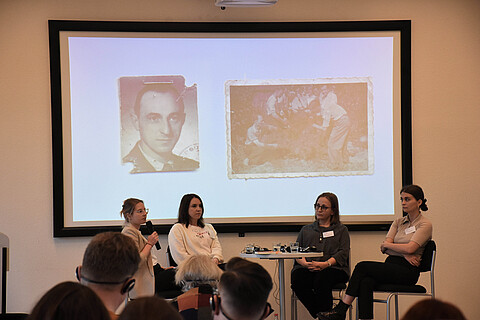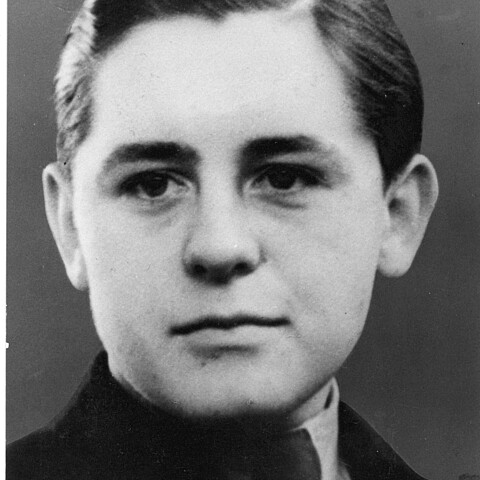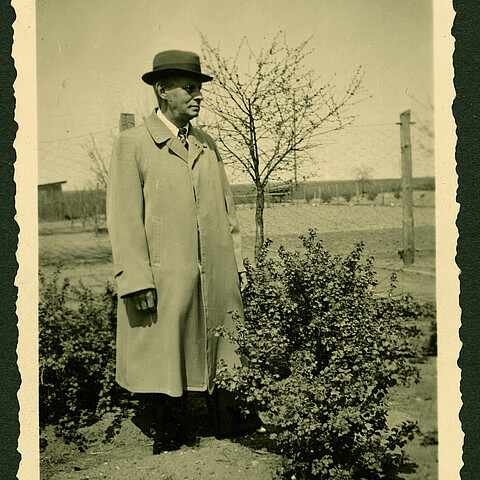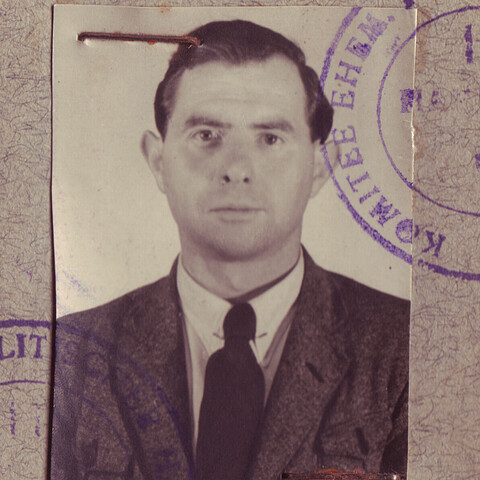Stadthaus Remembrance Site
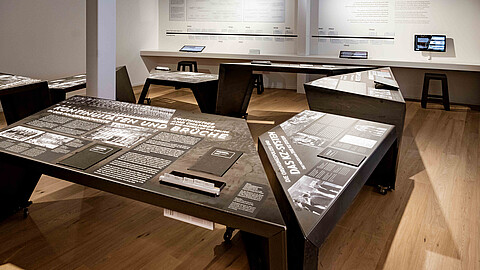
The Stadthaus at the Stadthausbrücke
was from 1933 to 1943 the headquarters of national socialist terror in Hamburg. The Stadthaus Remembrance Site commemorates this time period.
Two exhibitions present the place, the various criminal operations conducted and organised there by the Hamburg police, as well as the biographies of the persecuted women and men. The memories of those who were interrogated and tortured in the town hall can be heard in the historical "Seufzergang" ("corridor of sighs").
The Stadthaus Remembrance Site is located in the Stadthöfe, a shopping and business district. Since 2022, it has been part of the Foundation of Hamburg Memorials and Learning Centres Commemorating the Victims of Nazi Crimes.
Events (in german)
- Monday, April 22, 2024
- 18:30–20:30
- Lesung
Geschichtsort Stadthaus, Stadthausbrücke 6, 20355 Hamburg
Charlotte Groß (1905–1999): Das Leben einer Hamburger Widerstandskämpferin entdecken
Als junge Aktivistin der Arbeiterbewegung entscheidet sich Charlotte Groß 1933 für den illegalen Widerstand. Fünf Mal wird sie bis zum Beginn des Krieges verhaftet. 1935 und 1937 bringt sie unter… More information
- Saturday, April 27, 2024–Sunday, April 28, 2024
- Lange Nacht der Museen
Geschichtsort Stadthaus, Stadthausbrücke 6, 20355 Hamburg
Lange Nacht der Museen am Geschichtsort Stadthaus
18 Uhr – 19 Uhr: Eröffnung der Sonderausstellung „Erinnerte Gegenwart. Dokumente von Berthie Philipp aus dem Ghetto Theresienstadt und künstlerische Arbeiten von Marlies Poss“. Marlies Poss im… More information
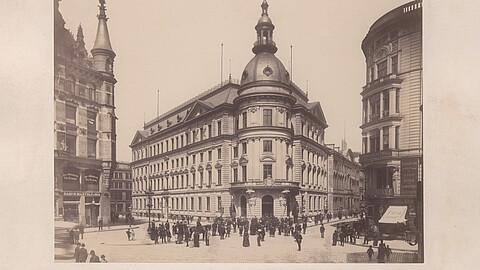
The Stadthaus at the Stadthausbrücke/Neuer Wall
is a complex of buildings that housed the central offices of the Hamburg police from 1814 to July 1943. Under National Socialism, the police headquarters, the state police and criminal investigation departments responsible for Hamburg and large parts of northwest Germany were housed here. Many hundreds of employees worked at this location. From the town hall, the police organised the systematic persecution of Hamburg's resistance against National Socialism, the persecution of Jews, Sintize and Sinti, Romnja and Roma as well as numerous other people, including many forced labourers, homosexuals or people stigmatised as "professional criminals" or "asocial".
In the interrogation rooms and holding cells of the town house, the arrested women and men were brutally abused, humiliated, tortured, murdered or driven to their deaths. Police officers forced confessions with "aggravated interrogations". The officers participated in decisions about life and death by sending people to concentration camps and submitting applications for "special treatment". Preparations for the wartime deployment of North German police officers, especially in Poland and the Soviet Union, where police battalions took part in numerous mass murder actions, also took place from the town hall.
During the air raids of "Operation Gomorrha" in July 1943, the Stadthaus building complex was heavily damaged. The police authorities relocated to other buildings in Hamburg's city centre.
The persecution
of tens of thousands of men and women in northern Germany was organised in the Stadthaus, as the headquarters of National Socialist terror, from 1933 to 1943. The Gestapo and Kripo also conducted interrogations in the Stadthaus, often accompanied by abuse and torture.
The women and men presented here were persecuted by the police for very different reasons. Several had been active in the Hamburg resistance against National Socialism or were persecuted as Jews, Sinti, Romnja and Roma and thus targeted for systematic murder. Others were arrested by the police as homosexuals, Jehovah's Witnesses or alleged "professional criminals". Clicking on a picture opens a short biography.
Regine Böhmer
was eight years old when the Sintezza was picked up by the police from her flat in Hamburg-Hammerbrook. Together with her parents and siblings she was deported to the Belzec labour camp in occupied Poland via the Hannoverschdr Bahnhof railway station on 20 May 1940. Some of the family members managed to escape, but they were arrested again and deported to concentration camps. The father and three brothers did not survive the concentration camp imprisonment. Regine Böhmer was sent to Ravensbrück concentration camp and experienced the liberation of the Bergen-Belsen concentration camp in April 1945.
Gertrud Rast
, née Graeser, fled to France in 1933 as a member of the German Communist Party KPD. There she was arrested in 1939 after the beginning of the Second World War at the age of 42, interned and finally extradited to the Gestapo in 1943. After several months of imprisonment, including in the Fuhlsbüttel police prison, she was transferred to the Wilhelmsburg Arbeitserziehungslager (Langer Morgen) in December 1944. After 1945 she was a leading functionary of the KPD and later of the floow-up party DKP in Schleswig-Holstein.
Jenta Honig
née Salik, was born in Poland in 1892. She lived with her husband, the merchant Osias Leib Honig, and their four children in Vienna and later on from 1935 onwards in Altona. The Jewish family made efforts to emigrate to Palestine, especially after the pogrom of November 1938. Three sons succeeded in escaping from Germany, but Jenta Honig, her husband and their son Willi were refused permission to leave the country. On 8 November 1941, they were deported from Hannoverscher Bahnhof railway station to the Minsk ghetto. All three died there.
Richard and Käthe Tennigkeit
, née Schlichting, were members of the German Communist Party KPD. After the Nazis came to power in 1933, the couple became active in illegal resistance work; they hid persecuted resistance fighters in their house, in a garden house settlement in Hamburg-Farmsen-Berne. In February 1944, they were arrested by the Gestapo. In April 1944, Käthe Tennigkeit died in the Fuhlsbüttel police prison. The Gestapo claimed that she had committed suicide. Richard Tennigkeit died in Neuengamme concentration camp in December 1944.
Dorothea and Erich Golly
were both members of the Jehovah's Witnesses denomination, even after it was banned in July 1933. For the couple, this resulted in years of imprisonment in penal institutions and concentration camps: Erich Golly died in the Dachau concentration camp in February 1945 after more than eight years in prison. Dorothea Golly was also sent to a concentration camp after serving her sentence. She was freed at the end of the war in Ravensbrück concentration camp, seriously ill and blind.
Helmuth Hübener
was a member of the Mormons and an apprentice administrator in the social administration. He began listening secretly to the British radio BBC when he was 16 years old. He spread what he learned in the form of self-written scatter notes and leaflets in the Hamburg districts of Hamm, Hammerbrook and Rothenburgsort. Three friends helped him. Following a denunciation by a work colleague, the Gestapo arrested the youths in February 1942. On 11 August 1942, the People's Court in Berlin sentenced Helmuth Hübener to death, his friends received prison sentences.
Alfred Kästel
ran a flower shop in Altona. In 1942, the Hamburg Regional Court sentenced the gardener to two years in prison for homosexual acts. Since he had previous convictions, the court suggested his following "preventive detention". After serving his sentence, the Hamburg criminal police arranged for Alfred Kästel to be transferred to Neuengamme concentration camp in July 1944. He died there on 5 November 1944 at the age of 65.
Arnold Hencke
grew up in a working-class family in Hamburg-Eimsbüttel. He was a member of the Socialist Workers' Youth (SAJ) and the SPD. Even under conditions of illegality, he continued his political work. The Gestapo succeeded in arresting Arnold Hencke and other members of the SAJ Eimsbüttel in January 1935. This was followed by ill-treatment and imprisonment in the Fuhlsbüttel concentration camp and the Hahnöfersand youth prison. On 30 July 1937, 21-year-old Arnold Hencke was released from prison. He suffered from the consequences of his imprisonment for the rest of his life.
Ernst Kröger
from Neumünster was imprisoned several times as a youth for theft and forgery of documents. In 1933 the trained moulder was sentenced to eight months in prison. After his release, he committed several burglaries and was sentenced to seven years in prison. In May 1943, he was sent to Neuengamme concentration camp as a preventive detainee, where he died a few weeks later on 19 June 1943 at the age of 29.
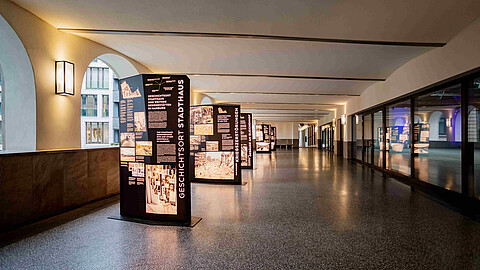
The main exhibition
"The Stadthaus during National Socialism. A Centre of Terror" focuses on various crime complexes committed by the Hamburg police under National Socialism as well as biographies of those persecuted. The exhibition on the Brückenarkaden (bridge arcades) provides information on the history of the construction and use of the building ensemble that is now the Stadthöfe. In the "Seufzergang" (Corridor of Sighs), through which prisoners were taken from the holding cells to the interrogation rooms, an audio station allows visitors to listen to reports by former prisoners about the interrogation situation and the mistreatment they suffered in the Stadthöfe. All exhibition elements are available in German and English.
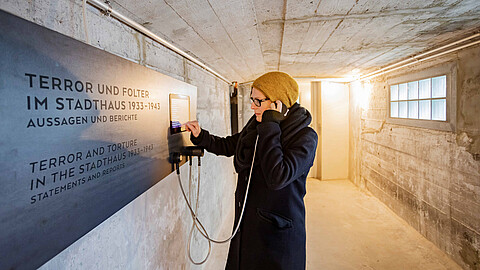
Address
Stadthausbrücke 6
D-20355 Hamburg
Opening hours
Monday–Saturday, 10 am–5 pm. Closed on Sundays and holidays.
Admission is free.
The exhibitions are accessible by wheelchair, the "Corridor of Sighs" is not.
Free tours of the Stadthaus and the Stadthaus Remembrance Site are held regularly.
Contact: Dr. Christiane Heß and Dr. Christine Eckel (Foundation of Hamburg Memorials and Learning Centres). Telephone: +49 (0) 40-428 131 580
E-mail: geschichtsort.stadthaus@gedenkstaetten.hamburg.de
Stigma
At the corner of Stadthausbrücke and Neuer Wall, the floor sculpture "Stigma" by missing icons is a reminder of the past terror and the long suppression of the history of the Stadthaus. Information about the artwork (in German language) can be found here.
![[Translate to English:]](/fileadmin/_processed_/a/f/csm_Jahresendbrief-2023-Foto_4bb0654692.png)
